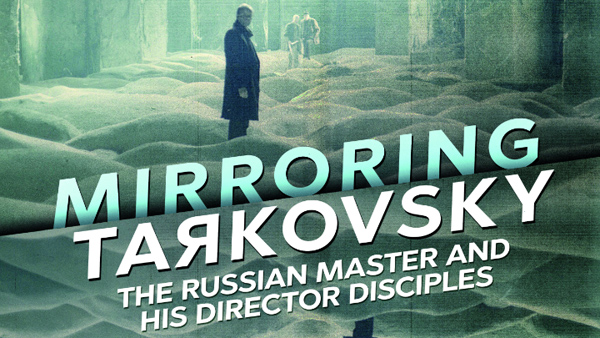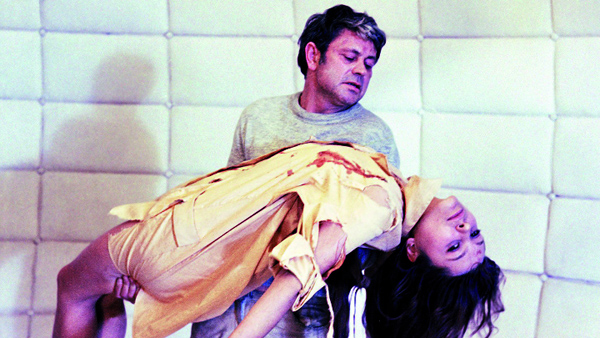MIRRORING TARKOVSKY: THE RUSSIAN MASTER AND HIS DIRECTOR DISCIPLES

Running from 19 October – 29 November, Mirroring Tarkovsky: The Russian Master and His Director Disciples will be a season dedicated to both the Russian auteur Andrei Tarkovsky, and those filmmakers whom he undoubtedly influenced including Lars Von Trier, Claire Denis, Steven Soderbergh and Nuri Bilge Ceylan. Screening from pristine new digital prints, all seven of Tarkovsky’s features including Solaris (1972), Stalker (1979) and Andrei Rublev (1966), plus a number of his short films, will be included in the season. There will also be an extended run of his masterful Mirror (1975) from Friday 23 October.
The son of a noted poet and an actress, Andrei Tarkovsky was born in Zavrzhe in 1932. He studied at the famous VGIK Moscow film school in 1959, producing a number of shorts including a work for television There Will Be No Leave Today (1959) and The Steamroller and the Violin (1960), which was written in collaboration with future director Andrei Konchalovsky, who went on to become a frequent collaborator, including working on the script for Andrei Rublev (1966). These short films will screen in a dedicated Shorts Programme alongside his student adaptation of Hemingway’s short story The Killers (1956).
Tarkovsky’s first feature Ivan’s Childhood (1962), tells the story of 12-year-old Ivan who, orphaned by Hitler’s invading troops, becomes a scout for the Soviet army, risking his life slipping between the marshy front lines. Ivan’s Childhood won Tarkovsky notice in the West by being awarded the Golden Lion at Venice. Tarkovsky’s next film displayed an enormous advance in his technique; Andrei Rublev (1966) is an episodic film, depicting eight moments in the life of Andrei Rublev, a 15th century Russian icon painter. The film was interpreted by many as an allegory for the plight of the artist under the Soviet regime, and consequently was not released commercially in Russia for a number of years. Tarkovsky’s critically acclaimed adaptation of Stanislaw Lem’s science fiction novel Solaris (1972) tells of a scientist sent to investigate mysterious events on a space station orbiting the planet Solaris. On arrival the scientist finds his dead wife alive in his cabin and tries to destroy her, but – as is the way in this unnerving science fiction classic – she keeps coming back.

Playing on extended run from Friday 23 October, Mirror (1975) is arguably the key film in Tarkovsky’s canon and as close to poetry as cinema gets. The fragmented memories of dying poet Alexei form this haunting autobiographical reverie, which interleaves poems by Tarkovsky’s father Arseny, a noted poet of the Soviet era. The film’s kaleidoscopic approach offers no straight narrative and combines incidents, dreams and memories along with news-reel footage. Tarkovsky’s final film made in Russia was another science fiction film, 1979’s Stalker. The ‘Stalker’ in the film is a guide who agrees to take ‘The Writer’ and ‘Professor’ into the forbidden ‘Zone,’ an area of hidden danger which contains a room that grants visitors their innermost desires. Paths through the desolate area – as much a state of mind as a place – can only be sensed, not seen, in this metaphysical maze.
In the early 1980s, Tarkovsky left Russia permanently; his filmmaking career started again in Italy where he followed a TV documentary Tempo di viaggio (1983) with Nostalgia (1983), written in collaboration with the distinguished screenwriter Tonino Guerra. In Nostalgia a Russian writer tours Tuscany with his translator, researching a suicidal 18th century Russian composer. Homesickness and despair frustrate him until he meets Domenico, a madman, who convinces him to take on a task – walking a lit candle from one end of a spa pool to the other – to ‘save the world.’ By the time Tarkovsky started work on his next and final film, The Sacrifice (1986) he knew he was seriously ill with cancer. A Swedish production, The Sacrifice is an allegory of self-sacrifice in which a man played by Erland Josephson gives up everything he holds dear to avert a nuclear catastrophe. The use of Josephson and cinematographer Sven Nykvist, both of whom were best known for their collaborations with Ingmar Bergman, indicate the influence of the Swedish director, one of the few directors that Tarkovsky really admired.
Many contemporary filmmakers have been influenced by Tarkovsky; from Béla Tarr and Lars Von Trier to Claire Denis and Steven Soderbergh. Many of his influences are clear – the long takes in Béla Tarr’s Werckmeister Harmonies (2000) and Steven Soderbergh’s take on Solaris (2002) for example, while some directors such as Lars Von Trier, Aleksandr Sokurov and Carlos Reygadas have explicitly cited his influence. The season will include screenings of Von Trier’s The Element of Crime (1984), Sokurov’s Mother and Son (1997) and Reygadas’ Japón (2002). Other work deeply indebted to Tarkovsky which will be screened will include Andrei Zvyagintsev’s The Banishment (2007) Claire Denis’ The Intruder (2004) and Nuri Bilge Ceylan’s Distant (2002), the latter of which even uses a sequence from Stalker as humorous counterpoint to a porn film on TV. For many great directors such as these, Andrei Tarkovsky remains their guiding spirit.




